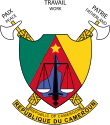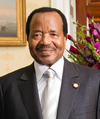
Back بوابة:الكاميرون Arabic Portal:Kamerun German Portal:Camerún Spanish Portail:Cameroun French Portal:Camarões Portuguese Портал:Камерун Russian باب:کیمرون Urdu
The Cameroon Portal
Cameroon, officially the Republic of Cameroon, is a country in Central Africa. It shares boundaries with Nigeria to the west and north, Chad to the northeast, the Central African Republic to the east, and Equatorial Guinea, Gabon and the Republic of the Congo to the south. Its coastline lies on the Bight of Biafra, part of the Gulf of Guinea and the Atlantic Ocean. Due to its strategic position at the crossroads between West Africa and Central Africa, it has been categorized as being in both camps. Cameroon's population of nearly 31 million people speak 250 native languages, in addition to the national tongues of English and French, or both. Early inhabitants of the territory included the Sao civilisation around Lake Chad and the Baka hunter-gatherers in the southeastern rainforest. Portuguese explorers reached the coast in the 15th century and named the area Rio dos Camarões (Shrimp River), which became Cameroon in English. Fulani soldiers founded the Adamawa Emirate in the north in the 19th century, and various ethnic groups of the west and northwest established powerful chiefdoms and fondoms. The official languages of Cameroon are French and English, the official languages of former French Cameroons and British Cameroons. Christianity is the majority religion in Cameroon, with significant minorities practising Islam and traditional faiths. It has experienced tensions from the English-speaking territories, where politicians have advocated for greater decentralisation and even complete separation or independence (as in the Southern Cameroons National Council). In 2017, tensions over the creation of an Ambazonian state in the English-speaking territories escalated into open warfare. Large numbers of Cameroonians live as subsistence farmers. The country is often referred to as "Africa in miniature" for its geological, linguistic and cultural diversity. Its natural features include beaches, deserts, mountains, rainforests, and savannas. Cameroon's highest point, at almost 4,100 metres (13,500 ft), is Mount Cameroon in the Southwest Region. Cameroon's most populous cities are Douala on the Wouri River, its economic capital and main seaport; Yaoundé, its political capital; and Garoua. Limbé in the southwest has a natural seaport. Cameroon is well known for its native music styles, particularly Makossa, Njang and Bikutsi, and its successful national football team. It is a member state of the African Union, the United Nations, the Organisation Internationale de la Francophonie (OIF), the Commonwealth of Nations, the Non-Aligned Movement and the Organisation of Islamic Cooperation. (Full article...) Selected article -At the crossroads of West Africa and Central Africa, the territory of what is now Cameroon has seen human habitation since some time in the Middle Paleolithic, likely no later than 130,000 years ago. The earliest discovered archaeological evidence of humans dates from around 30,000 years ago at Shum Laka. The Bamenda highlands in western Cameroon near the border with Nigeria are the most likely origin for the Bantu peoples, whose language and culture came to dominate most of central and southern Africa between 1000 BCE and 1000 CE. European traders arrived in the fifteenth century and Cameroon was the exonym given by the Portuguese to the Wouri river, which they called Rio dos Camarões—"river of shrimps" or "shrimp river", referring to the then-abundant Cameroon ghost shrimp. Cameroon was a source of slaves for the slave trade. While the northern part of Cameroon was subject to influence from the Islamic kingdoms in the Chad basin and the Sahel, the south was largely ruled by small kings, chieftains, and fons. Cameroon as a political entity emerged from the colonization of Africa by Europeans. From 1884, Cameroon was a German colony, German Kamerun, with its borders drawn through negotiations between the Germans, British, and French. After the First World War, the League of Nations mandated France to administer most of the territory, with the United Kingdom administering a small portion in the west. Following World War II, the League of Nations' successor, the United Nations, instituted a Trusteeship system, leaving France and Britain in control of their respective regions, French Cameroon and British Cameroon. In 1960, Cameroon became independent with part of British Cameroons voting to join former French Cameroon. Cameroon has had only two presidents since independence and while opposition parties were legalized in 1990 only one party has ever governed. Cameroon has maintained close relations with France and allied itself largely with Western political and economic interests throughout the Cold War and into the twenty-first century. This consistency gave Cameroon a reputation as one of the most stable countries in the region. In 2017, tensions between Anglophone Cameroonians in former British territory and the Francophone-dominated government led to an ongoing civil war known as the Anglophone Crisis in the west of the country, while Islamist insurgents Boko Haram continue to carry out military and terror attacks in the north of the country. (Full article...)Did you know (auto-generated)More did you know -
General images -The following are images from various Cameroon-related articles on Wikipedia.
WikiProjectsTopicsCategoriesRelated portalsAssociated WikimediaThe following Wikimedia Foundation sister projects provide more on this subject:
Discover Wikipedia using portals | ||||
© MMXXIII Rich X Search. We shall prevail. All rights reserved. Rich X Search




























































